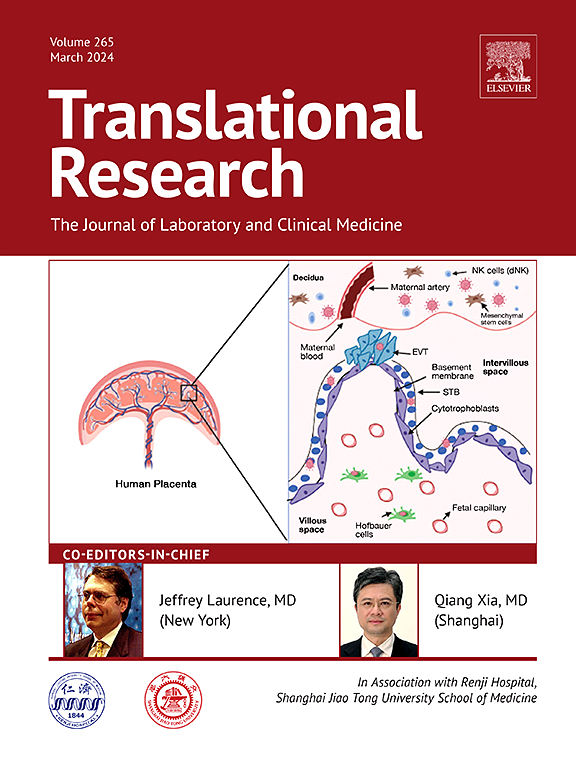肽精氨酸脱亚胺酶4的缺失通过抑制炎症和纤维化途径减轻心肌梗死后不适应的心脏重构
IF 5.9
2区 医学
Q1 MEDICAL LABORATORY TECHNOLOGY
引用次数: 0
摘要
炎症和进行性纤维化是心肌梗死(MI)后心力衰竭(HF)发展的预测危险因素。肽精氨酸脱亚胺酶4 (PAD4)催化多肽中精氨酸残基的瓜氨酸化,最近被确定为HF发病机制的一个贡献者。本研究旨在评估PAD4在心肌梗死和心衰进展后单核/巨噬细胞(Mo/Mφ)和心脏成纤维细胞(CFs)心脏修复中的作用。永久性冠状动脉结痂导致心肌梗死的小鼠以及心肌梗死死亡的人心脏中Padi4的表达显著增加。转录组分析显示,心肌梗死后第7天,PAD4全基因敲除(PAD4−/−)小鼠的梗死心脏和心脏Mo/Mφ中炎症相关基因显著下调,并伴有修复性CD206+巨噬细胞频率增加。在机制上,药物和基因PAD4抑制可消除骨髓源性巨噬细胞(BMDM)的核NF-κB易位和炎症基因表达。同时,PAD4−/−CFs中炎症的减少和心肌转化生长因子-β (TGF-β)水平的降低以及IL-6 / TGF-β信号的受损与纤维化基因表达的降低、胶原沉积的减少、心功能的改善以及PAD4−/−小鼠28天生存率的提高有关。引人注目的是,尽管心肌梗死后急性期的PAD药物抑制加重了心脏损伤,但从第7天开始的治疗改善了小鼠的心脏重塑并提高了长期存活率。总之,我们在这里确定了PAD4是Mo/Mφ中炎症基因和cf中纤维化途径的关键调节因子。因此,针对PAD4的治疗方法有望缓解不良的心脏重构和随后的HF发展。本文章由计算机程序翻译,如有差异,请以英文原文为准。
Loss of peptidylarginine deiminase 4 mitigates maladaptive cardiac remodeling after myocardial infarction through inhibition of inflammatory and profibrotic pathways
Inflammation and progressive fibrosis represent predictive risk factors for heart failure (HF) development following myocardial infarction (MI). Peptidylargininine deiminase 4 (PAD4) catalyzes the citrullination of arginine residues in polypeptides and has recently been identified as a contributor to HF pathogenesis. This study aimed to evaluate the role of PAD4 in monocytes / macrophages (Mo/Mφ) and cardiac fibroblasts (CFs) for cardiac repair following MI and HF progression. Cardiac Padi4 expression significantly increased in mice subjected to MI by permanent coronary artery ligation as well as in humans who died from MI. Transcriptome analysis revealed marked downregulation of inflammation-related genes in infarcted hearts and cardiac Mo/Mφ from global PAD4 knockout (PAD4−/−) mice on day 7 post-MI accompanied by increased frequency of reparative CD206+ macrophages. Mechanistically, pharmacological and genetic PAD4 inhibition abrogated nuclear NF-κB translocation and inflammatory gene expression in bone marrow-derived macrophages (BMDM). Simultaneously, reduced inflammation and diminished cardiac levels of transforming growth factor-β (TGF-β) along with impaired IL-6 / TGF-β signaling in PAD4−/− CFs were associated with decreased expression of fibrotic genes, reduced collagen deposition, improved cardiac function, and enhanced 28-day survival in PAD4−/− mice. Strikingly, whereas pharmacological PAD inhibition in the acute phase after MI exacerbated cardiac damage, treatment starting on day 7 ameliorated cardiac remodeling and improved long-term survival in mice. Collectively, we here identified PAD4 as a critical regulator of inflammatory genes in Mo/Mφ and of profibrotic pathways in CFs. Thus, therapeutic approaches directed against PAD4 are promising interventions to alleviate adverse cardiac remodeling and subsequent HF development.
求助全文
通过发布文献求助,成功后即可免费获取论文全文。
去求助
来源期刊

Translational Research
医学-医学:内科
CiteScore
15.70
自引率
0.00%
发文量
195
审稿时长
14 days
期刊介绍:
Translational Research (formerly The Journal of Laboratory and Clinical Medicine) delivers original investigations in the broad fields of laboratory, clinical, and public health research. Published monthly since 1915, it keeps readers up-to-date on significant biomedical research from all subspecialties of medicine.
 求助内容:
求助内容: 应助结果提醒方式:
应助结果提醒方式:


